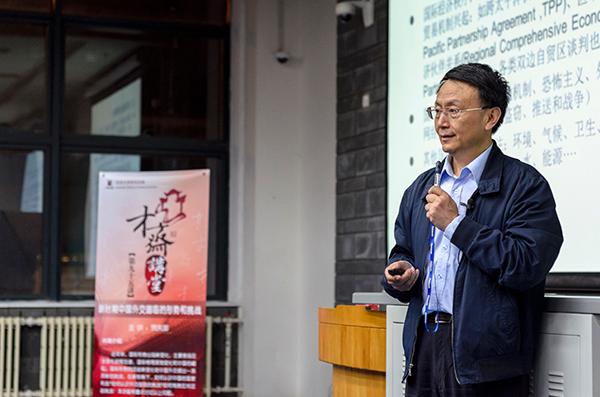
At 7 pm on April 2, 2015, the 95thPeking University Caizhai Lecture Series "Situation and Challenges faced by China' s Diplomacy" was held in 107 of the second teaching building. The lecturer was Jia Qingguo, Dean, Professor and Doctoral Supervisor of School of International Studies, Peking University, Standing Committee Member of the 12th CPPCC and Director ofInstitute for Global Cooperation and Understanding, Peking University (iGCU). The lecture was presided over by Gao Dai, Associate Dean of the Graduate School of Peking University and Associate Professor of the Department of History.
Professor Jia Qingguo addressed the topic in three aspects: "The current international situation facing China' s diplomacy" , "Main problems and challenges" and "Diplomacy and China' s future".
Professor Jia pointed out that in the context of the process of globalization accelerating and deepening, and the world pattern changing and transforming, the uncertainty of the relationship between China and the outside world is increasing. Transnational creation, manufacturing and consumption speed up the circulation of funds, technologies and talents globally. All countries in the world have to face the ever-increasing issues of international political and economic order, security order and even environment, immigrant, anti-corruption, transnational crime, food and energy. At the same time, the deepened interdependency and interactions between China and the world' s economy poses a challenge to Chinese traditional development concepts, and forces China to abandon its approach of "minding its own business" .

In Prof. Jia' s opinion, the rising China faces uncertainty and contradictoriness in terms of identity and interests in the international arena. This poses serious challenges to China' s ability in handling foreign relations and also proposes new requirements for China' s formulation of foreign policy and its efforts in forging international relationships. Issues such as "how to protect our own interests" , "how to insist the strategic targets of the national foreign policy", "how to deal with China-US relations, as well as relations between China and neighboring countries", "how to play an active and constructive role in the international arena" and "how to maintain the validity and rationality of China' s diplomacy" are problems we must face.
Targeting at these problems, Prof. Jia pointed out that we must protect our interests in the past and the present, and we must protect our interests in the future too. We should cautiously define our core interests and keep a low profile. We must follow the trend and keep calm, and remember never to "draw our sword" willfully.
When it came down to China-US relations, Prof. Jia said that though the first superpower status of the US is and will remain unshakable in the foreseeable future, its economy was badly hit in the financial crisis in 2008, so was its military capabilities. As a result, the US' s comprehensive strength in the world dropped. On the other hand, China' s size of economy started to catch up quickly and it now owns a series of advanced weaponries represented by the aircraft carrier and J-20, and the quality of PLA' s military training also improved significantly. China does not engage in territorial expansion, instead, it increases its wealth and gain status and reputation globally via trade. In addition, its gaps with the US in terms of market economy, rule of law, human rights and democracy are narrowing. All these help to avoid confrontation between a rising power and a hegemonic power. But it requires joint efforts from both parties, which shall cautiously handle this relationship and prevent the escalation of worries to hostility, confrontation and even war. On that basis, China and the US have made certain efforts in climate issues, Ukraine problem and the North Korea nuclear problem and achieved some progress, however, the effects are not so obvious.
Prof. Jia also mentioned that the key of China' s relationship with neighboring countries lies in the disputes of territorial and maritime rights with Southeast Asia countries and Japan, as well as our historical issue with Japan. To Prof. Jia, it is a test for the new generation of Party leaders and government leaders to stick to the principle, control the disputes and avoid conflict. Prof. Jia believes that we have to stick with the principle of "China holds sovereignty, lay aside the dispute and develop jointly" proposed by Deng Xiaoping. This principle was suitable in the past, it is still suitable in the present and will be suitable in the future.
After the lecture, the attending students interacted with Professor Jia and actively expounded upon their ideas and experience.Gao Dai spoke highly of the lecture, saying that Professor Jia' s explanations were "calm, comprehensive, rational and pragmatic" , and that he also put forward his own views on many problems facing China' s diplomacy from the perspective of history.
